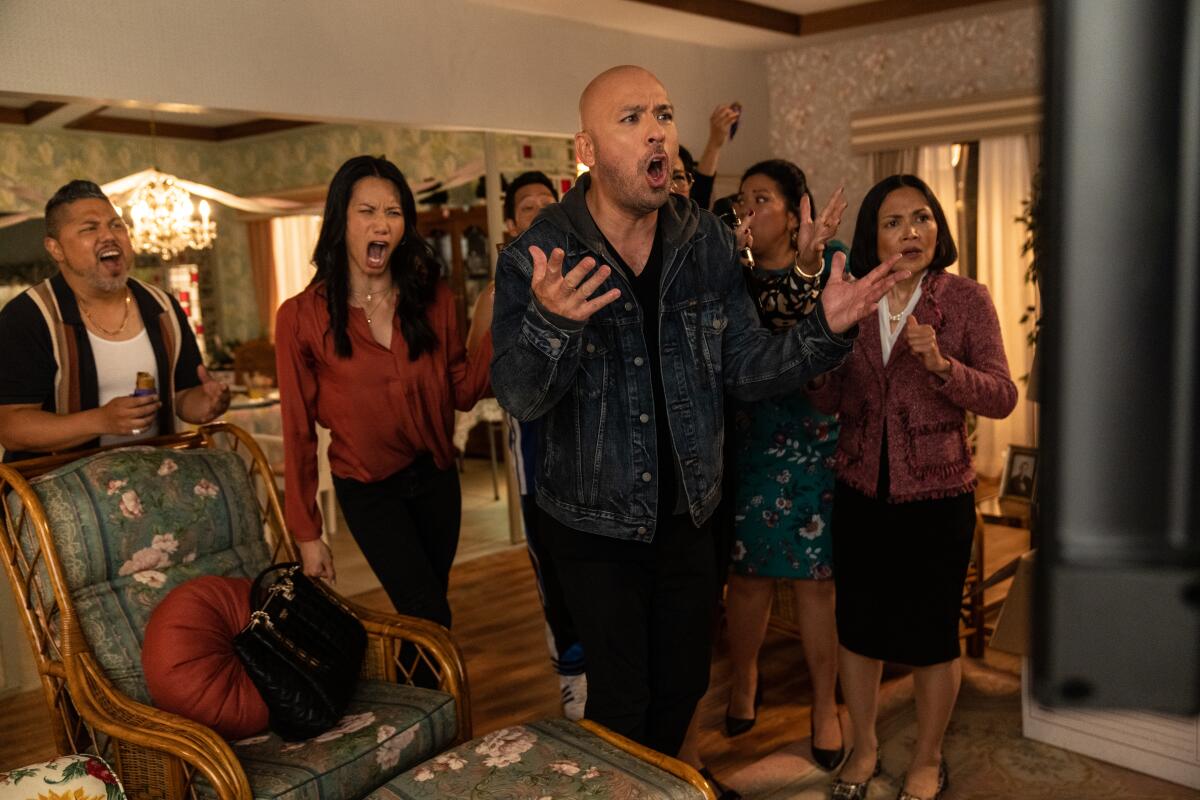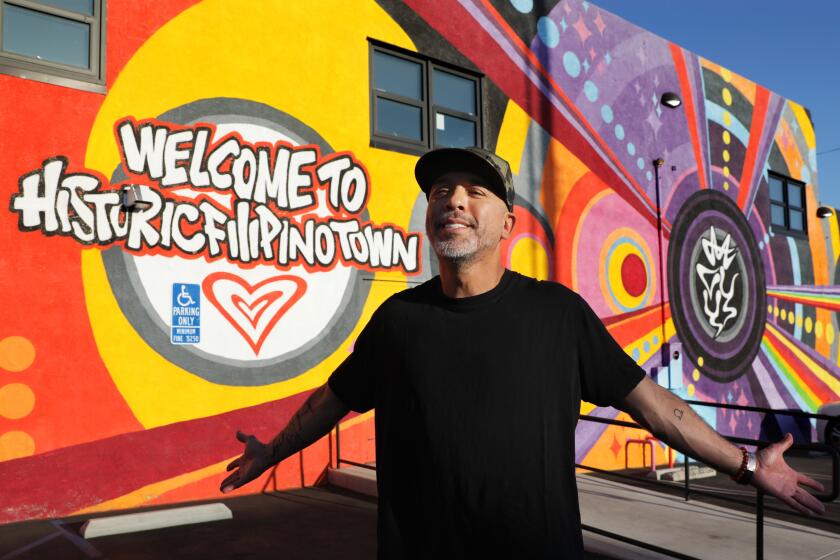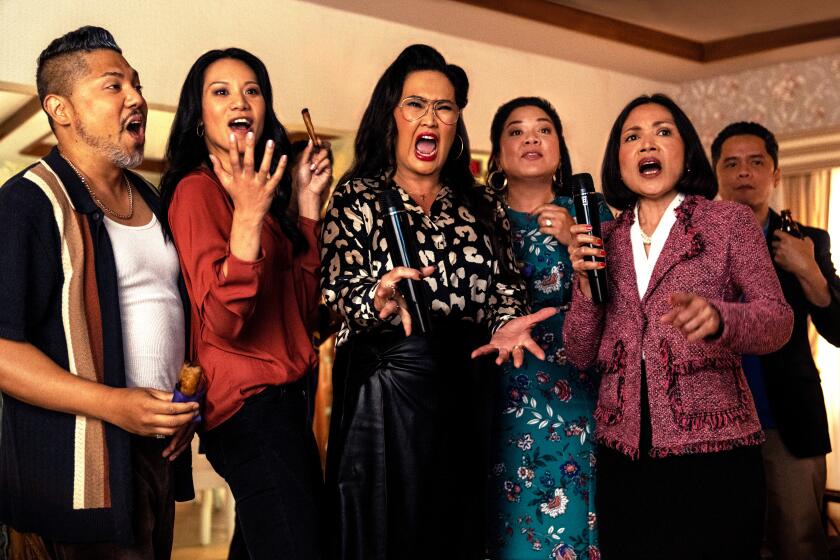Op-Ed: For Filipino Americans, seeing ourselves in a summer movie is a wonder

- Share via
History takes on many forms. This week, it meant sending text messages to all my relatives in the Bay Area, wondering how many Filipinos — and friends of Filipinos — I can pack in a theater on a Sunday afternoon. After about an hour of texting pinsans (cousins), titos and titas (aunties and uncles), kuyas and ates (anyone older than you), on top of fielding calls from lolas (grandmothers) who insisted on talking instead of texting, I was up to 76.
“If there’s more tickets,” texted Tita Aida, who, like me, immigrated to the Bay Area from the Philippines in 1993. “Can I have three more?”
Added Aida’s daughter, Gladys, my cousin and best friend: “Count me in for three tickets!”
This is a groundbreaking weekend for Filipinos. “Easter Sunday,” starring comedian Jo Koy, opens in theaters nationwide, becoming the first major Hollywood studio film about Filipino Americans, the largest Asian American population in California and among the largest immigrant groups in the country.
The Filipino American comedian is getting his first shot as a Hollywood leading man after a long, hard grind. And he’s ready for the limelight.
Partly autobiographical, the film tells the story of Joe Valencia (Koy), a struggling comedian and actor looking for his Hollywood break while juggling his responsibilities as a single dad and the inevitable drama that comes with having an extended, multigenerational immigrant family. Like Koy, Valencia is multiracial and grapples with his identity and what it means to look, sound and be Filipino.
Representation matters — so goes a rallying cry for Hollywood that seeks to diversify the stories it tells and sells. But on the way to telling and selling universal stories with universal themes like love, family and belonging, we can lose the specifics, especially when it comes to telling stories of Latinos and Asians, whose increasing numbers are challenging and changing the perception of the United States as a Black and white country.
As an immigrant kid in the 1990s, my assimilation process consisted of consuming all the popular culture I could swallow. Most everything was told from a white point of view, before I realized that the Irish, Italians and Germans were immigrants like me. Growing up, all Asians had for on-screen representation was “All-American Girl,” an ill-fated ABC sitcom starring Margaret Cho, plus a hodgepodge of actors of different ethnicities playing Korean. It was the sliver we were given.
For Carrere, who is Hawaiian and Filipino, Jo Koy’s “Easter Sunday” is the first time in her long career that she plays a character of her ethnicity.
Asian American onscreen representation has come a long way since then, from “Everything Everywhere All at Once,” to “Never Have I Ever,” to “Minari,” to every Netflix live-action anime adaptation. The Asian American diaspora, numbering 22 million people with immigrant roots tracing back to more than 20 countries, can no longer be denied. Filipino Americans, however, remain woefully outside the spotlight, particularly when it comes to Hollywood productions.
“May it be in theater or in publishing or in Hollywood — there’s always been barriers that Filipinos who want to tell our stories our way have had to face,” said Pati Navalta, author of “The Oracles: My Filipino Grandparents in America.” I met Pati in 2000, just when I was starting out in journalism. She was then an editor at the San Francisco Chronicle and one of the few Filipinas editing in Americans newsrooms. “Jo Koy is opening a gate. This film marks an opening for more films,” she said.
Koy said he wanted Filipinos to see themselves on the big screen. And boy, are we up on the screen, all right. Co-written by Ken Cheng, a Filipino American who is ethnically Chinese, the film is loaded with cultural references, from halo halo, our favorite shaved ice dessert, to Santa Niño, which adorns many Filipino houses, including mine. A balikbayan (expatriate) box serves as more than a prop; the caring, communal spirit that the box summons — Filipinos here in America taking care of relatives and frie0nds they left behind — sits in the middle of the narrative action.
Watching the film, I had to remind myself that I was watching Filipino actors play Filipino characters, which seems like an obvious point, except when you hear the stories of Hollywood veterans such as Tia Carrere and Lou Diamond Phillips.
Phillips plays himself in the film, and it’s only the third time that the 60-year-old actor, who was born in Subic Bay, not far from my grandparents’ hometown, has played a Filipino character. In a career spanning almost 40 years, Carrere, who is of Filipino, Spanish and Chinese descent, has played Chinese, Vietnamese and Japanese characters, but never someone who is Filipina — until this film, where she plays Tita Theresa.
“What does it feel like, playing this role? It feels like I can finally be myself,” Carrere told me after a special screening organized by Gold House, which has spearheaded the #GoldOpen movement, supporting Asian American films.
I met Koy for the first time at that screening. I’ve seen all his comedy specials, like most of my relatives, who could recite his jokes, sometimes word for word. Seeing him in person, basking in the moment, you recognize that he recognizes that this Hollywood moment is so much bigger than him.
“When I look at the screen, I see my family,” Koy told me. “I see my community. I see us.”
He has shown us all his Filipino messiness in “Easter Sunday” — which I will be watching alongside 105 relatives and friends of relatives in a theater in Santa Clara, close to where I grew up, on Sunday afternoon.
Jose Antonio Vargas is the founder of Define American, a nonprofit media organization, and the author of “Dear America: Notes of an Undocumented Citizen.”
More to Read
A cure for the common opinion
Get thought-provoking perspectives with our weekly newsletter.
You may occasionally receive promotional content from the Los Angeles Times.












